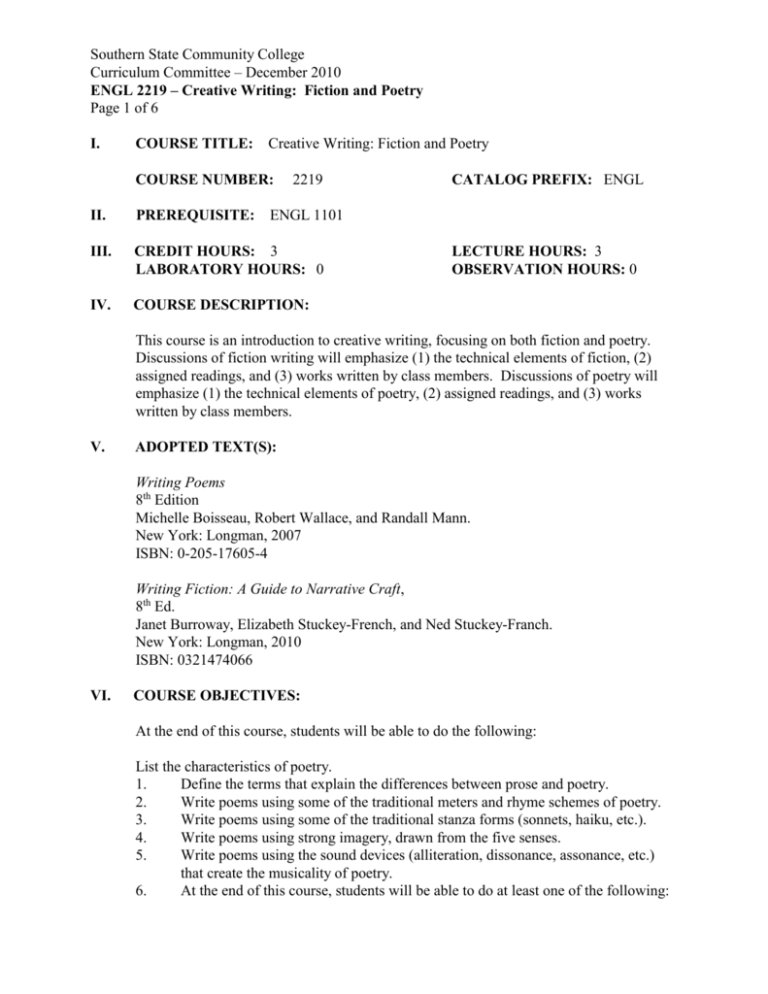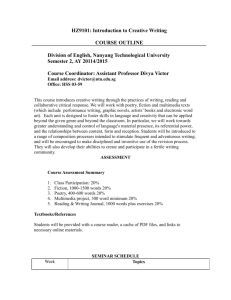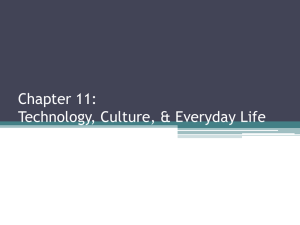ENGL 2219 - Creative Writing Fiction and Poetry
advertisement

Southern State Community College Curriculum Committee – December 2010 ENGL 2219 – Creative Writing: Fiction and Poetry Page 1 of 6 I. COURSE TITLE: Creative Writing: Fiction and Poetry COURSE NUMBER: 2219 II. PREREQUISITE: III. CREDIT HOURS: 3 LABORATORY HOURS: 0 IV. COURSE DESCRIPTION: CATALOG PREFIX: ENGL ENGL 1101 LECTURE HOURS: 3 OBSERVATION HOURS: 0 This course is an introduction to creative writing, focusing on both fiction and poetry. Discussions of fiction writing will emphasize (1) the technical elements of fiction, (2) assigned readings, and (3) works written by class members. Discussions of poetry will emphasize (1) the technical elements of poetry, (2) assigned readings, and (3) works written by class members. V. ADOPTED TEXT(S): Writing Poems 8th Edition Michelle Boisseau, Robert Wallace, and Randall Mann. New York: Longman, 2007 ISBN: 0-205-17605-4 Writing Fiction: A Guide to Narrative Craft, 8th Ed. Janet Burroway, Elizabeth Stuckey-French, and Ned Stuckey-Franch. New York: Longman, 2010 ISBN: 0321474066 VI. COURSE OBJECTIVES: At the end of this course, students will be able to do the following: List the characteristics of poetry. 1. Define the terms that explain the differences between prose and poetry. 2. Write poems using some of the traditional meters and rhyme schemes of poetry. 3. Write poems using some of the traditional stanza forms (sonnets, haiku, etc.). 4. Write poems using strong imagery, drawn from the five senses. 5. Write poems using the sound devices (alliteration, dissonance, assonance, etc.) that create the musicality of poetry. 6. At the end of this course, students will be able to do at least one of the following: ENGL 2219—Creative Writing: Fiction and Poetry Page 2 of 6 Write a short story that contains the main elements of fiction: plot, character, setting, point of view. Write a short play that contains an appropriate structure, setting, character, and dialogue. VII. GRADING: Grading will follow policy in the SSCC catalog. A B C D F 90 – 100 80 – 89 70 – 79 60 – 69 0 – 59 VIII. COURSE OUTLINE: Week 1: Class Introductions Introduction to Reading Poetry Reading as a Writer Image/Metaphor and Concrete Detail In-Class Writing The Shakespearean Sonnet Course Objectives Covered: 1, 2, 3, 4 Week 2: In-Class Writing Discussion of Readings Discussion of Our Writing The Petrarchan Sonnett Rhyme Course Objectives Covered: 1, 2, 3, 4 Week 3: In-Class Writing Discussion of Readings Discussion of Our Writing Sound in Poetry The Blues Poem ENGL 2219—Creative Writing: Fiction and Poetry Page 3 of 6 Course Objectives Covered: 1, 2, 3, 4, 5 Week 4: In-Class Writing Discussion of Readings Discussion of our Writing Verse/Line/Meter Scansion The Haiku The Villanelle Course Objectives Covered: 1, 2, 3, 4, 5 Week 5: In-Class Writing Discussion of Readings Discussion of Our Writing The Sestina Workshop Course Objectives Covered: 1, 2, 3, 4, 5 Week 6: In-Class Writing Discussion of Readings Discussion of Our Writing Blank Verse Workshop Course Objectives Covered: 1, 2, 3, 4, 5 Week 7: In-Class Writing Discussion of Readings Discussion of Our Writing Free Verse Workshop Course Objectives Covered: 1, 2, 3, 4, 5 Week 8: Final Poetry Workshop Introduction to Fiction Reading as a Writer Plot ENGL 2219—Creative Writing: Fiction and Poetry Page 4 of 6 In-Class Reading In-Class Response In-Class Writing Course Objectives Covered: 1, 6 Week 9: In-Class Writing Discussion of Readings Discussion of Our Writing Setting Scene Showing versus Telling Course Objectives Covered: 1, 6 Week 10: In-Class Writing Discussion of Readings Discussion of Our Writing Point of View Course Objectives Covered: 1, 6 Week 11: In-Class Writing Discussion of Readings Discussion of Our Writing Characterization Course Objectives Covered: 1, 6 Week 12: In-Class Writing Discussion of Readings Discussion of Our Writing Creating Effective Dialog Dialect Course Objectives Covered: 1, 6 Week 13: In-Class Writing Discussion of Readings Discussion of Our Writing Symbol and Metaphor in Fiction ENGL 2219—Creative Writing: Fiction and Poetry Page 5 of 6 IX. Parable and Allegory Workshop Course Objectives Covered: 1, 6 Week 14: In-Class Writing Discussion of Readings Discussion of Our Writing Genres of Fiction Tropes Workshop Course Objectives Covered: 1, 6 Week 15: In-Class Writing Discussion of Readings Discussion of Our Writing Revision Final Fiction Workshop Course Objectives Covered: 1, 6 Week 16 Finals Week: Collect Portfolios Public Reading OTHER REQUIRED BOOKS, SOFTWARE AND MATERIALS: None X. EVALUATION: Students will be evaluated on: -their written work, -preparation for class, -attendance, and -participation in class discussion and activities A final portfolio of student work will contain examples of original work: -poetry (types to be assigned by the instructor), and -at least one short story, and/or -a short play. XI. SPECIFIC MANAGEMENT REQUIREMENTS: ENGL 2219—Creative Writing: Fiction and Poetry Page 6 of 6 Work will be submitted for evaluation in manuscript form, as described by the instructor. XIII. OTHER INFORMATION: FERPA: Students need to understand that your work may be seen by others. Others may see your work when being distributed, during group project work, or if it is chosen for demonstration purposes. Students also need to know that there is a strong possibility that your work may be submitted to other entities for the purpose of plagiarism checks. DISABILITIES: Students with disabilities may contact the Disabilities Service Office, Central Campus, at 800-628-7722 or 937-393-3431.





